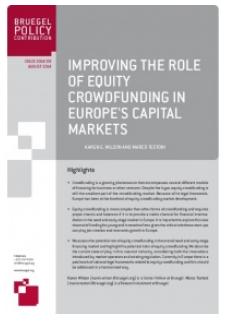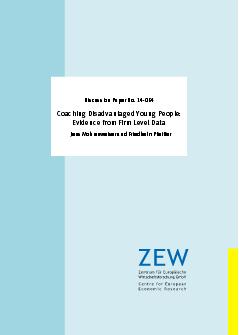Whyman, P. B. (2014) “Keynes and the International Clearing Union: A Possible Model for Eurozone Reform?“, JCMS: Journal of Common Market Studies. doi: 10.1111/jcms.12180, 07 August. Economic and monetary union in Europe, as currently constituted, has a number of structural weaknesses. Large, persistent international payments imbalances necessitate deficit nations to deflate their economies or squeeze social wages in order to restore competitiveness. Surplus nations accrue reserves, with little pressure to …Read More
Improving the role of equity crowdfunding in Europe’s capital markets
Wilson, Ε. Κ. & Testoni, M. (2014) “Improving the role of equity crowdfunding in Europe’s capital markets“, Bruegel Organisation, 29 August. Crowdfunding is a growing phenomenon that encompasses several different models of financing for business or other ventures. Despite the hype, equity crowdfunding is still the smallest part of the crowdfunding market. Because of its legal framework, Europe has been at the forefront of equity crowdfunding market development. Equity …Read More
A European sanctions compensation fund?
Gros, D. (2014) “A European sanctions compensation fund?“, Economic Policy, CEPS Commentaries, 12 August. Daniel Gros explores in a new CEPS Commentary the feasibility of creating a common fund to provide compensation for the economic costs of sanctions as an integral part of the EU’s foreign-policy stance that is now emerging towards Russia, albeit slowly and painfully. Τhe EU has now finally agreed to impose ‘third-level sanctions’ against Russia. …Read More
Is Europe saving away its future? European public funding for research in the era of fiscal consolidation
Veugelers, R. (2014) “Is Europe saving away its future? European public funding for research in the era of fiscal consolidation“, VoxEU Organisation, 28 August. The Crisis affected public spending. Research and innovation is one area often highlighted as needing protection. This column does not find strong evidence that European countries sacrificed research and innovation more than other government expenditure. However, there is strong heterogeneity across countries. Innovation lagging and …Read More
European Bond Market: Bubble of all Bubbles!
EconMatters (2014) “European Bond Market: Bubble of all Bubbles!“, Global Market Economics Matters, 27 August. European Bond Rush Right now investors in European Bonds are running over each other all in an effort to front run what the Big Banks have been begging the ECB to begin a bond buying program similar to the United States’ QE bond buying program. Tourism has its Limitations It is hilarious as European …Read More
Coaching Disadvantaged Young People: Evidence from Firm Level Data
Mohrenweiser, J. & Pfeiffer, F. (2014) “Coaching Disadvantaged Young People: Evidence from Firm Level Data“, ZEW Discussion Paper No. 14-054, Centre for European Economic Research, August. This paper analyses the risk of unemployment, unemployment duration and the risk of longterm unemployment immediately after apprenticeship graduation. Unemployed apprenticeship graduates constitute a large share of unemployed youth in Germany but unemployment incidence within this group is unequally distributed. Our paper extends …Read More
The lack of gender equality in EU decision-making means EU citizens are still suffering from a ‘double democratic deficit’
Mushaben, J. M. & Abels, G. (2014) “The lack of gender equality in EU decision-making means EU citizens are still suffering from a ‘double democratic deficit’“, LSE EUROPP Blog, 28 August. The EU has often been accused of having a democratic deficit with respect to deficiencies in the representation of citizens in EU decision-making. Joyce Marie Mushaben and Gabriele Abels discuss the role of gender equality in assessments of …Read More
The meaning of democracy changes for Europeans depending on their education status, income and national context
Magalhães, C. P. & Ceka, B. (2014) “The meaning of democracy changes for Europeans depending on their education status, income and national context“, LSE EUROPP Blog, 27 August. Most Europeans value democracy, but do all citizens have the same conception of what democracy is? Pedro C. Magalhães and Besir Ceka assess variations in how Europeans conceive of democracy and analyse the various factors which underpin different interpretations. Their findings …Read More
Fixing Europe’s Orbán Problem
Brenner, T. & Reinicke, W. (2014) “Fixing Europe’s Orbán Problem“, Social Europe Journal, 26 August. In April, when German Chancellor Angel Merkel congratulated Hungarian Prime Minister Viktor Orbán on his reelection, she let it be known that his large majority implied a “special responsibility” to use good judgment and behave with sensitivity toward opponents. He has done exactly the opposite. Indeed, Orbán has consistently defied the European Union’s core values and …Read More
Mario Draghi At Jackson Hole
Wren-Lewis, S. (2014) “Mario Draghi At Jackson Hole“, Social Europe Journal, 26 August. To understand the significance of yesterday’s speech (useful extract from FT Alphaville here), it is crucial to know the background. The ECB has appeared to be in the past a centre of what Paul De Grauwe calls balanced-budget fundamentalism. I defined this as a belief that we needed fiscal consolidation (austerity) even when we were in a liquidity trap (i.e. interest rates were …Read More







